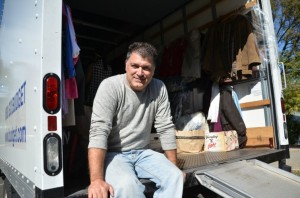It’s a sunny Sunday afternoon in the parking lot of Our Mother of Consolation Church in Chestnut Hill. One car after another pulls into the lot, and volunteers from the St. Vincent dePaul Society walk out to greet the drivers, gratefully accepting bags of clothes, shoes, housewares … anything that can be recycled or re-sold. With some assistance from overeager OMC elementary school kids, they tote all the plastic bags and clothing on hangers up a ramp and pile them up inside a large trailer.
If your church has ever held its own clothing drive and you’ve wondered where all that stuff wound up, Robert J. McCormac can tell you. He provided the trailer, and all of the goods, in this case, will go to his soon-to-open thrift store at Aramingo and Cedar in Port Richmond. It’s called The Thrifty Irishman.
From a trailer like the one parked on the OMC lot, McCormac salvages what he can—which is usually a lot—and the proceeds go to the organizations like the St. Vincent dePaul Society.
“If a program like the St. Vincent dePaul Society or your kid’s church wants a clothing drive, we try to have it be a win-win for everybody,” says McCormac. “They get a cut.”
If anyone understands the economics of salvage, it’s McCormac. He was taught by experts.
McCormac was born on St. Patrick’s Day, 1968, and he grew up in Kensington. At 14, McCormac went to work for salvage impresario Dick Segal, who ran a thrift store called Jo-Mar, also in Kensington. Segal’s shop would buy up department store seconds, and re-sell them at a fraction of their department store price.
Some kids hear music, and resolve they’re going to be the next Stevie Ray Vaughan. They go to the see a play, and they want to be a stage manager. They help revive a baby bird, and they want to be a vet.
Bob McCormac wanted to be just like his newfound mentor, Dick Segal.
“I watched what he did. He could sell anything. He used to say, ‘Anybody can sell the good stuff’,” McCormac recalls with a laugh. “He’s an amazing salesman. He could take a gently used $600 Armani suit, and say to the customer, ‘You could have a tailor take it in.’ Whatever success I’ve had in my life, I owe to Dick Segal. I’ve never not been in the salvage business.”
From 14 on, McCormac never looked back. He’s always had a knack for taking what some people might consider trash, and turning it into other people’s treasure. The salvage trade, he explains, holds undeniable appeal for anyone with an entrepreneurial spirit—and a high degree of risk tolerance. “It’s a matter of being your own man,” McCormac says. “You’re always out and about, trying to make a deal. Sometimes, it means I’m eating peanut butter and jelly. Sometimes I’m eating filet mignon. I’m OK with that.”
In his early 20s, McCormac set out on his own, joining with partners to open a thrift shop operation called Budget Express. It lasted eight years and, even though the business didn’t last, he believes he learned even more about what it takes to make it in his chosen line of work.
Banking on that experience, he set out to try it again. “I looked at several locations over the years. Then I found this building in Port Richmond. It had heavy wooden posts, with brick walls. It was very open.”
In McCormac’s business, lots of open space is essential. In this case, it’s 10,000 square feet.
“It has to be that size,” McCormac says. “You don’t want people coming in the door, and saying to themselves that they’ve seen everything. You want it to be a treasure hunt.”
Then there was the question of what to name the place. Two friends immediately stepped up to the plate.
The first was Mike Schweirzer, who stated the obvious. “You were born on St. Patrick’s Day,’ he said. ‘You’ve always been lucky like a leprechaun. You should name your store the Thrifty Irishman’.”
Next, his son’s art teacher, Marcie Hull , volunteered to design his logo—a dark green leprechaun with a shamrock, his booted foot propped up on a jar. Presumably, of gold.
McCormac’s landlord is working with the city to have all the permitting finalized and, if McCormac’s legendary luck holds, the shop will open on or about November 8. In the meantime, he’s busily amassing lots of saleable goods.
When the store opens, McCormac will continue to follow the example of his mentor Dick Segal—and his simple yet tried-and-true business plan. “We’ll sell clothing, household items, design items, a little bit of architectural salvage. We come across a lot of stuff. The real goal is to sell a lot of stuff for not a lot of money.”

